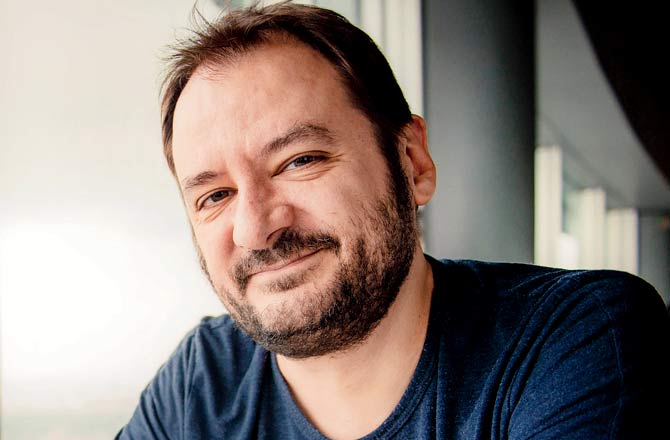What is the secret to being a happy centenarian? The men behind an international bestseller, who researched a Japanese island, say finding a purpose to live is a good start. And 'converts' in India are feeling the change

In an Indian home, where the elderly intone, "Jug, jug jiyo", you know that blessings for a long life have been preferred over happiness. But, on the Japanese island of Okinawa, longevity never required godly intervention. It enjoys the highest average number of centenarians in the world—24.55 people over the age of 100 for every one lakh inhabitants. The women live even longer. Back in 2015, the island caught the attention of Spaniards Héctor García and Francesc Miralles. The result of their journey there is the new bestselling global rage, Ikigai: The Japanese Secret to a Long and Happy Life (Penguin Random House).
ADVERTISEMENT
Barcelona-based Miralles first heard about the "immortal" and "incredibly joyful" Okinawans from his friend García, who had married a woman from the island. "We knew there was something more interesting at work," he says in a telephonic interview. The two decided to undertake a year-long psychological investigation on the island. "We observed how they [the residents] lived, related to each other, and what their general philosophy of happiness was. During interviews, they mentioned the word ikigai, once too often," he remembers. The book, originally written in Spanish, attempts at unravelling this mysterious idea that has even found a fan in American talk show host and philanthropist Oprah Winfrey.

Francesc Miralles
Ikigai, says Miralles, is a Japanese concept that roughly translates as "the happiness of always being busy". The duo discovered that the Okinawans's Ikigai was simply having a strong purpose for living—what the French describe as raison d'être—and tight social bonds, both of which promised the constancy of happiness. Ikigai, the authors explain, is closer to Austrian neurologist-psychiatrist Viktor Frankl's logotherapy. Frankl's school of psychology "pushes patients to consciously discover their life's purpose in order to confront their neuroses". A Holocaust survivor, he identified himself as the first patient of his own practice. When he was imprisoned in Auschwitz, he had on him a manuscript that contained all the theories and research he had compiled over the course of his career, ready for publication. After it was confiscated, he felt compelled to write it all over again. "That need drove him, gave his life meaning amid the constant horror and doubt of the concentration camp. So much so, that over the years, and especially when he fell ill with typhus, he would jot down fragments and key words from the lost work on any scrap of paper he found," the authors write in the book.
"I think the wisdom of Ikigai can be used in any place in the world. It is not specific to culture," says 51-year-old Miralles, author and journalist. "If you have a reason to live, you can resist any circumstance. The philosophy of the act of conversation and keeping ties with neighbours and friends is also important. In the States [US], you will notice that many people who are depressed or don't take care of their bodies, simply don't have a strong relationship [with themselves or others]." Miralles adds, "A passion is important. It could simply be about learning a new language or something more social or spiritual. It will keep changing. But, if you have an Ikigai, life puts things in movement, you find new meaning, and start taking care of yourself." This purpose, he says, will also stand you in good stead. "So when other things are not going so well for you, maybe because somebody you love doesn't love you back, or because situation at work isn't great, this purpose offers you a sense of balance and compensates you."

Hector García
In the book, the authors suggest multiple habits that could be included into your daily routine, to experience the joie de vivre of the Okinawans. The "miracle diet" of green tea, cutting sugar and eating at least five servings of fruit and vegetables every day, incorporating exercises like yoga, tai chi and qigong are said to keep the heart and mind healthy. Focusing on positive feelings of happiness, love, serenity and gratitude, help keep anxiety in check. They also suggest reducing time spent on checking emails or being on social media. "The phone is alienating. We think we are communicating, but we are not. The kind of communication we are establishing is of poor quality. Many people use it [social media] to fight loneliness, but after two hours in front of a screen, you actually feel a lot lonelier than before. Human beings are expected to touch, feel and look at each other. It helps relationships grow," Miralles explains. The Spanish writer says that like Okinawans, Indians too, have imbibed some aspects of the Ikigai philosophy, without realising. "People in India have a natural curiosity for others; they talk to you and share experiences. This is more important than having money. You need to be able to share your inner troubles and expectations. The key to happiness is communication."
The 10 rules of Ikigai
- Stay active; don't retire
- Take it slow
- Don't fill your stomach
- Surround yourself with good friends
- Get in shape for your next birthday
- Smile
- Reconnect with nature
- Give thanks
- Live in the moment
- Follow your ikigai
Source: Ikigai: The Japanese Secret to a Long and Happy Life
'I am now grateful for this life'
Purabi Naha Mumbai Blogger, homemaker
It has only been two months since Goregaon resident Purabi Naha, who runs the food blog Cosmopolitan Currymania, picked up the book, but she says her life has already taken a turn for the better. "I think I have become reflective," says Naha, a mother of two. "Everything I was doing seemed like a chore, whether it was cooking, running the home or writing my blog. I felt something was lacking, but I couldn't figure out what," she remembers. Ikigai, she says, gave her a reason to get out of bed every morning. The first thing she does now on waking up, is express gratitude for one more day in her life and feel thankful for the people who make it worth it. When Naha would sit down to tutor her 10- and 12-year-old children, she would feel burdened. "I hadn't thought about the value I was bringing to their lives [as a parent]. There has been a shift in my perspective towards them. I feel I am moulding them, and it's giving me pleasure."

'I made bird-watching my purpose'
Amrita Talwar Delhi Publicist, mother
Delhi-based books publicist Amrita Talwar encountered Frankl's book Man's Search for Meaning, at a fair. "It eventually led me to Ikigai," she says. Talwar, who suffers from everyday stress remembers reading spiritual titles and meeting therapists and friends, to find a resolution but little helped. Soon, she was shutting herself from the world, affecting her nine-year-old son. "I once saw him cry, and I knew that I needed to do something about it," she says. "After reading, I realised that my stress would never go away. But, if I had a focus and something to live for, I'd be able to make peace with my condition," says Talwar. Talwar calls her son, her ikigai. And that realisation has helped her see the world differently. "Now, when I am faced with a stressful situation, instead of focusing on it, I cook for him, sit down to teach him, or we head out for a stroll." The other purpose Talwar found was bird-watching, which draws heavily from the Ikigai philosophy of connecting with nature. "I was always a bird-watcher, but I take it more seriously now. My dream is to spot all the species in the world. This has made me look forward to weekends, when we head out, and become more responsible towards the environment." The process of learning has been slow, but treating the book like a lifeguard, Talwar says she picks it up anytime she feels she is sinking.
Catch up on all the latest Mumbai news, crime news, current affairs, and also a complete guide on Mumbai from food to things to do and events across the city here. Also download the new mid-day Android and iOS apps to get latest updates
 Subscribe today by clicking the link and stay updated with the latest news!" Click here!
Subscribe today by clicking the link and stay updated with the latest news!" Click here!






